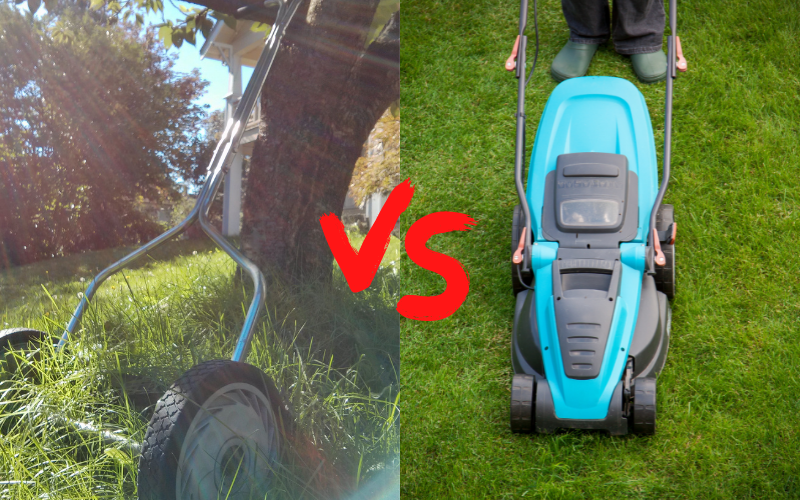If your lawn is fairly small and you’re in the market for a new mower, out of the dozens of different options available, you have maybe narrowed it down to two; the reel mower vs electric. Both options are ideally suited to smaller lawns, so how do you make two become one and settle on a specific type of mower? I always think that in this situation it’s a good idea to make a simple list of pros and cons, and use this as a guide to figure out which type of mower would match up better to your yard, storage options and personal preferences.
But you don’t need to spend time putting together that list, as I’ve done it for you.

Reel Mower vs Electric: What’s the Difference?
Before we get into the nitty-gritty, let’s just take a top-level look at the reel mower vs electric mower. What exactly is the difference?
A reel mower is very simple in its design and is not motorized. It features a cylinder of blades, two wheels and a main shaft that has a handle attached to the end. That’s it! You push it forward, and the blades rotate to cut the grass. Some models do offer the option of attaching a grass catcher, but more often than not reel mowers are used without one.
Electric mowers by contrast are motorized and are powered by either the mains (corded electric) or a battery (cordless electric). If you look at a reel lawn mower vs electric, they do look quite different. An electric mower has a much bigger footprint, has 4 wheels, and uses a rotary blade that is located under the mower deck, out of sight.
If I had to sum up the main differences in one sentence, it’d be that a reel mower is not motorized and uses a cylinder blade, whereas an electric mower is motorized and uses a rotary cutting blade.
Comparing the Push Reel Mower vs Electric
I’ve given you the top-level overview of how these two types of mower differ, but I doubt that’ll be enough to help you figure out which is the best match for your particular requirements. So what I’m going to do below is look at a number of key areas and tell you how these mowers stack up against each other.
Power + Mowing Conditions
There is quite a significant difference here. Remember, reel mowers are people-powered (no motor), while electric mowers are powered by an electric motor. This makes a difference when it comes to cutting power.
Electric mowers have the edge. A good electric mower will provide you with decent cutting power. Why is this important? Well, if you happen to let your lawn overgrow a bit, have some weeds growing in the lawn or maybe have a thicker grass variety, an electric mower is going to be more capable of doing the job. A reel mower, on the other hand, will likely struggle in such situations.
For this reason, it’s really, really important to keep on top of your mowing if you opt for a reel mower. I can tell you from experience that if you frequently let your grass grow long, mowing sessions are something you’re going to dread, as longer grass will just keep locking the blades up, and mowing the lawn will take much longer (if your reel mower is not spinning, this may be a very simple explanation as to why, although there are others). One reel mower I had when I was much younger would get jammed with thin twigs regularly. It was a pain to keep stopping to remove them!
Bottom Line: Electric mower has more power – reel mowers require you to mow more frequently.

The Blade
As I mentioned a little earlier, the two big differences when looking at a push reel mower vs electric mower are the motor and the blade. We’ve just discussed the motor, now let’s focus on the blade.
With a reel mower, it’s a cylinder blade. And it’s not just one blade either. Depending on the model you buy, this cylinder will typically have 5 or 7 blades that spin forward as you push the mower. This motion results in the blade slicing through the grass (different to an electric mower as you’ll see), which is the best way to cut grass. By slicing the grass, the wound where the cut occurs at the end of the grass blade is minimal and the grass is able to heal faster.
Electric mowers on the other hand almost always feature a rotary blade that spins parallel to the ground, under the mower deck. If the blade is maintained in good condition – properly sharpened and balanced – it can still deliver a good cut, but it’ll never be quite as clean a cut as what a reel mower gives you.
Bottom Line: The cylinder blade on a reel mower provides a cleaner cut than the rotary blade on an electric mower.
Maintenance
This is where the reel mower vs electric mower debate starts to become more balanced as there’s really not a lot of difference. Both of these types of mowers are among the lowest maintenance, which is a big advantage in most people’s eyes.
With a reel mower, the design is so barebones that the only thing you really need to pay any attention to are the blades. Give them a sharpen 1-2 times per year, and you’ll be golden.
With the electric mower, the blade is also the main thing you will need to pay attention to. You’ll need to remove it to sharpen it. And then with a corded unit, the main other maintenance task you’ll need to take care of is cleaning the underside of the deck, which can get caked in old clippings if you’re not careful, which leads to poorer performance.
With a cordless electric mower, you also have battery maintenance. Following the correct processes for charging can have a big impact on battery life, especially when it comes to the end of the season when you’re not going to be using your mower for a while.
Bottom line: Both options are low maintenance, but the ultra-simplistic design of the reel mower just shades it, with the sharpening blades the only task to think about.
Storage Requirements
A lot of folks focus only on the part where the lawn mower is going to be rolling over their lawn. But what about the rest of the time? Where are you going to store your lawn mower? The storage space you have available should also play a part in what you ultimately decide to buy.
The storage profile of a reel mower is very minimal, so if you have very little storage space – maybe your home is only small or is already overflowing with other stuff – this is a big plus. And not only is a reel mower small to store; it can also be hung on the wall. That is something I really, really like about reel lawn mowers. My gas mower definitely doesn’t hang on the wall and is fairly bulky!
Electric mowers can’t claim to store as well, but some models can be fairly lightweight to the point that they can be hung up too (hover mowers are a good example of this). But most electric mowers will require a bit more storage space. Lots of models do now allow you to fold over the handle completely to save some space though.
Bottom Line: You’ll need more space to store an electric mower than you will reel mower.
Noise
This may or may not be an important consideration for you. For the folks that do wonder “how loud is this lawn mower likely to be?” before they buy, you’ll be pleased to know that both reel mowers and electric mowers are on the quieter end of the spectrum.
Electric lawn mowers typically produce somewhere between 65 and 75 decibels, which is similar to normal conversation. Reel mowers, as they’re not motorized, are a bit quieter at 55 decibels. Neither of these options is going to annoy the neighbors, make you lose your hearing or scare your pets.
Bottom Line: Both electric mowers and reel mowers are relatively quiet, although reel motors produce less noise due to the lack of a motor.

Price
This is another area in which reel mowers and electric mowers are very similar. You can find options for both under the $100 mark, and if you have a very small lawn most of these options will work just fine.
You can find both reel and electric mowers that go up to several hundred dollars in price too. So I’m not saying that all reel mowers and all electric mowers are cheaper; they both run the whole range from budget to the very expensive. Some of the high-end cordless electric mowers are among the most expensive push mowers available (good battery technology is expensive).
What I would say is that if you pay $200-300 for a reel mower, the quality of the product is often better than an equivalent electric mower. The more basic design allows them to use better quality components.
Bottom Line: Pricing for both reel and electric mowers runs the whole gamut from very cheap to expensive, but in my experience, the cost-quality ratio is slightly better for reel mowers.
Running Costs
The upfront costs and the maintenance costs are not the only types of costs you need to consider when looking to buy a new lawn mower. There’s also the matter of the running costs. And there’s only one winner in that category if we’re comparing the reel lawn mower vs electric.
Reel mowers have no running costs! You are literally the fuel. You push them and they mow. This is a nice bonus, as once you’ve spent the money to purchase it, there’s really very little financial outlay with a reel mower. So when you factor in both the initial outlay plus the non-existent running costs, a reel mower is really the cheapest way to cut your grass.
Electric mowers on the other hand do require you to pay for, well, electric. Whether that’s to charge the batteries or to power it directly from the mains. This is still normally very economical, but it is an ongoing cost. Something to think about if you only have a small lawn!
Bottom Line: Reel mowers have no ongoing running costs – you can’t beat that – while the running cost of electric mowers is typically very affordable.
Quick Overview of Reel Mowers
There’s a lot to consider here. I’m now going to break down the pros and cons for you in some quick bullet points.
Here’s what’s to like and what’s not so good about reel mowers.
Pros of Reel Mowers
- Very affordable upfront costs
- Basic design and very simple operation
- Cylinder blades produce a clean, crisp cut that leaves grass healthy
- Very little noise (55 decibels)
- Super compact for storage and can be hung on a wall
- No ongoing running costs to worry about
- Maintenance requirements as simple as can be – just sharpen the blades
Cons of Reel Mowers
- You need to mow regularly as they do not cope with long grass well
- Will also struggle with weeds and thicker grass varieties
- Mowing large areas can take longer than with an electric mower
Quick Overview of Electric Mowers
The same thing for electric mowers. Here are the main points that I think you should pay attention to.
Pros of Electric Mowers
- Options available at all price points, from the very cheap to the expensive
- Maintenance requirements almost as minimal as with reel mowers
- Noise produced no louder than normal conversation
- Has more power than a reel mower, so more forgiving if grass is a little overgrown
- Thicker grass and weeds less of a problem
Cons of Electric Mowers
- Rotary blade is not as good for the health of your lawn
- Ongoing running costs – they are minimal, but they’re there
- Require more storage space than reel mowers
Final Thoughts on Reel Mowers vs Electric Mowers
I personally would only buy a reel mower if I had a very small lawn to take care of. One that I could mow completely in say 20 minutes max. In most other scenarios I would most likely recommend an electric mower as they offer a lot of the benefits that reel mowers offer, and the power provided by the motor means it can adapt a bit better to conditions that are not ideal (longer, thick grass + weeds, for example).


Leave a Reply